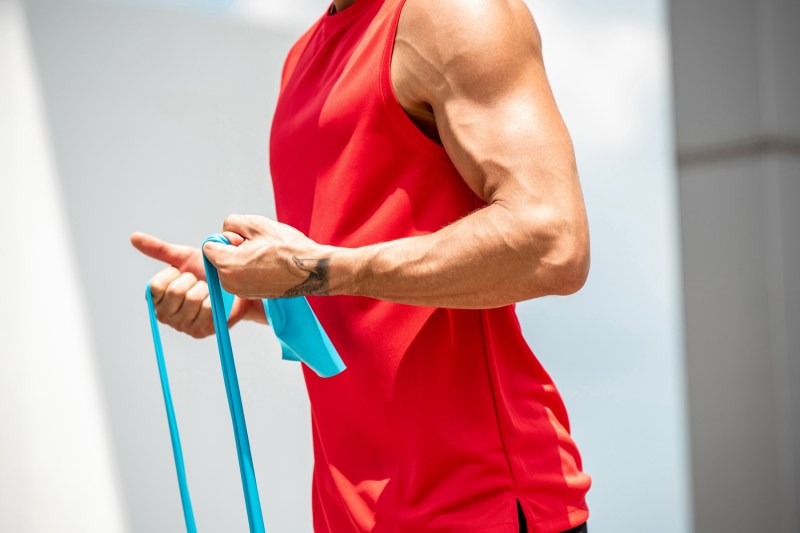
People love working out their arms with resistance bands because it’s a convenient way to build strength. You can also use them in a variety of ways wherever you go. This is especially helpful when traveling, because a dumbbell or kettlebell might not be so easy to find.
If you’re new to regular strength training or you’ve recently recovered from an arm injury, exercise bands allow you to increase mobility and flexibility in that area. Below, check out the top six exercises to include in your resistance bands arm workouts.

Anatomy of the arms
Your arms are the upper limbs of your body. These complex and most-used body parts include five main components.
- Shoulder
- Upper arm
- Forearm
- Wrist
- Hand
Your upper arm muscles are grouped into five main muscles located in the area between your shoulder and elbow. Divided into two separate compartments of each arm, your anterior flexor muscles include the following:
- Biceps brachii
- Coracobrachialis
- Brachialis
Your posterior extensor muscle includes the triceps brachii. Sometimes the anconeus muscle is classified as part of this muscle group because its function compares to the triceps brachii muscle. However, the anconeus muscle is officially part of the superficial posterior compartment of your forearm.
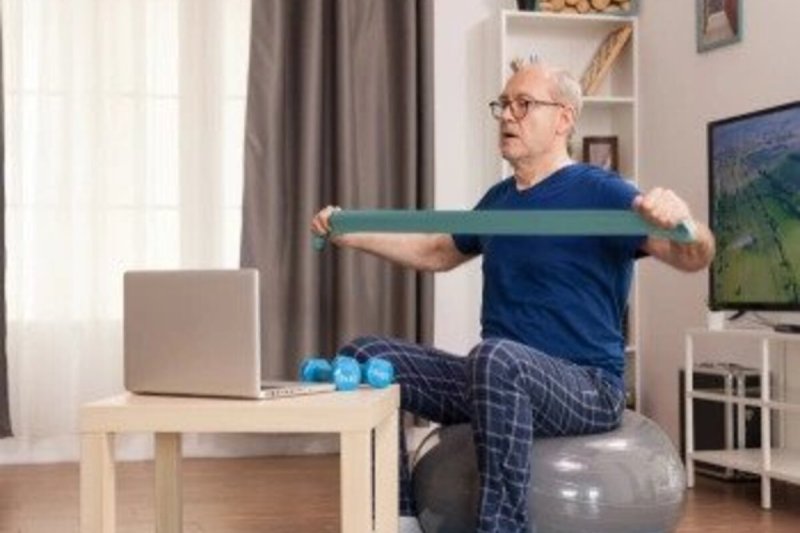
What are the benefits of exercising your arms?
A strong upper body is essential if your overall fitness is important to you. If you want to live a healthy life and enjoy a more active lifestyle, include arms and shoulders with strength training through a resistance band in your regular workout routine.
Let’s take a look at some other benefits of resistance band arm exercises,
Heart health
When you include exercises like bicep curls and other weightlifting movements into your daily or weekly workouts, you’ll enjoy a healthier heart. When your heart is strong and resilient, you’ll find it easier to keep your weight down and avoid artery damage from conditions like high cholesterol, high blood sugar, and high blood pressure.
Active stretching and activation of your arm muscles gets them ready for any kind of physical activity and builds your endurance at the same time. This improves your circulation and reduces the risk of heart disease. It doesn’t take a lot of equipment or high impact to get the blood flowing and raise oxygen levels.
Speed
If you’re looking to increase your speed as a runner, cyclist, or overall athlete, strong arms can help. Of course, runners and cyclists need powerful legs, but they need powerful arms too. Working out your upper body will boost both endurance and speed.
Fast runners and cyclists, as well as swimmers or those in team sports, will credit both arm strength and size to their success. If they’re sprinters, they need strong shoulders to generate maximum forward propulsion. A strong upper body provides extra thrust ability that pushes the athlete forward on the bike, on their feet, or in the pool.
For long distances, athletes require optimal form as well as toned arms that can easily support and steer a bike or swing and move a runner more effectively. This automatically increases step or pedal, or kick frequency.
Upper body strength for good running, swimming, or cycling performance is vital. Strong arms contribute to toned abdominal and back muscles as well. You’ll reduce unnecessary movements and more efficiently transfer energy from the body to the legs. Proper arm technique provides your legs with the best support and protects your frame from injury.
Fitness level
Incorporate upper body strength training to boost your workout, get in better shape, and strengthen your bones. Weightlifting can build bone density in your arms due to the pressure the body endures when under a load. Increased bone density is helpful as you age because you’ll be less likely to suffer from osteoporosis and arthritis.
At the same time, you’ll improve your posture by strengthening muscles that prevent slouching. You’ll walk with greater confidence and feel fewer aches and pains along the way. This optimal conditioning improves every aspect of your health.
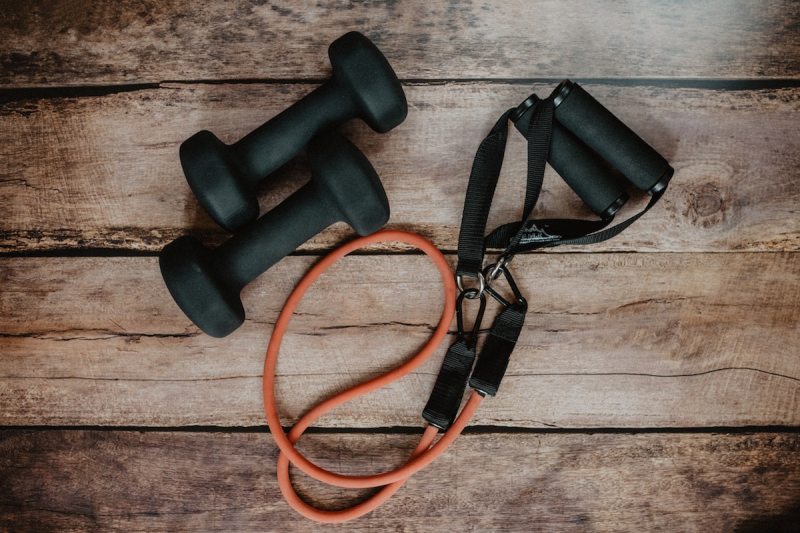
How to pick the best resistance bands
When you’re looking for the best resistance bands, consider those that work on recovery, on-the-move strength training, and physical therapy all in one. If you don’t have access to proper weights or you’re rehabilitating from an injury, a quality resistance band is a crucial accessory.
Resistance bands seem like simple sleeves of plastic, but you’ll soon enjoy leaner muscle and greater overall mobility. They also cost way less than kettlebells and dumbbells. You can easily pack bands in your gym bag or suitcase, too.
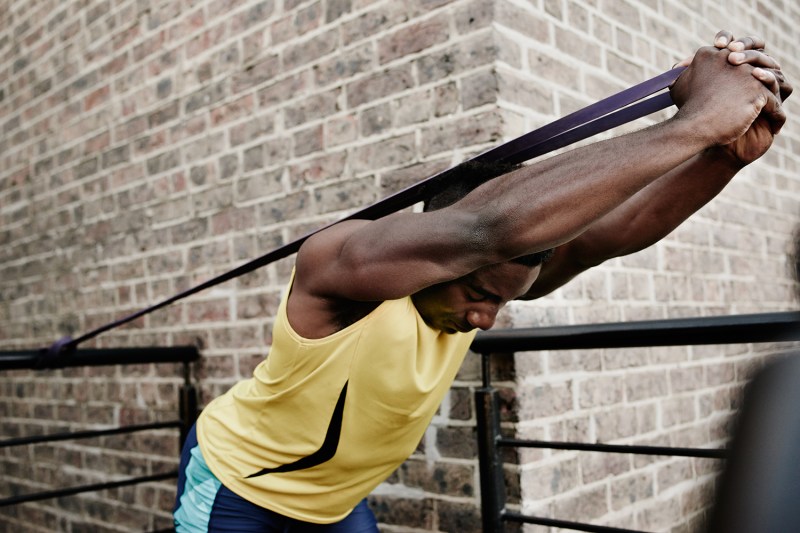
Can you lose arm fat when using exercise bands for the arms
Yes, it’s possible. Resistance bands are effective tools for toning and strengthening your muscles, including the muscles in your arms. When you use resistance bands with your arms, you’re working against the resistance of the band, which helps build muscle and burn calories.
To lose arm fat, you need to create a calorie deficit. This means burning more calories than you consume each day. You can create a calorie deficit by eating a healthy diet and exercising regularly. Resistance band arm workouts can help you burn calories and tone your arms, which can lead to a reduction in arm fat.
It’s important to note that spot reduction isn’t possible. You can’t lose fat from just one area of your body. However, by losing overall body fat, you can also lose fat from your arms. Resistance band workouts can help you lose overall body fat and tone your arms at the same time.
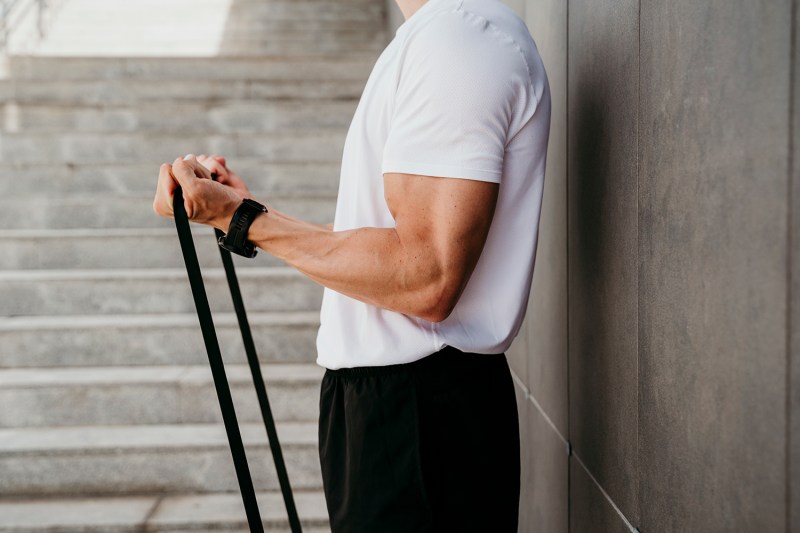
6 effective arm exercises with resistance bands
1. Overhead tricep extensions
Resistance band overhead tricep extensions will isolate your tricep muscle and avoid strain in different areas of your body. This can be done at home, at the gym, or on the road.
Muscles targeted
- Triceps
How to perform
- Stand with one foot slightly in front of the other.
- Put the center of the resistance band under your back foot.
- Bring the handles together straight up over your head.
- Slowly lower the handles behind the back of your head until your elbows bend at 90 degrees.
- Keep your elbows close to the side of your head.
- Press your hands back up over your head slowly.
2. Straight-arm pulldowns (open grip)
This exercise is great for strengthening your back as well as your triceps and improving your overall posture. You can also benefit from this if you’re a beginner or seasoned athlete.
Muscles targeted
- Lats
- Forearms
- Abs
- Deltoids
- Upper back
- Triceps
How to perform
- Hook your resistance band to an elevated clip or door frame.
- Grab the band with straight arms and palms facing down. Have an open grip so that your fingers don’t wrap around the band; instead, the band should be securely placed in the center of your palm.
- Hinge slightly at the hips and maintain a straight back.
- Contract your lats and pull the band down to your hips.
- Squeeze your lats when you get to the bottom.
- Slowly return to the starting position.
3. Hammer curls
This effective resistance band bicep curl is known for building size and strength in the biceps and forearms. Go easy on your wrists by keeping a lighter rather than tighter grip to perfect this resistance band bicep workout.
Muscles targeted
- Forearms
- Biceps
How to perform
- Stand with your feet shoulder-width apart.
- Loop the resistance band under your feet.
- Hold it in each hand with palms facing each other.
- Bend your elbows and curl the band toward your shoulders without moving your upper arms.
- Keep your palms facing each other the entire time.
- Pause.
- Lower back to the starting position.
4. Concentration curls
Instead of getting a break between repetitions, curls with a resistance band keep constant tension going. This will make your bicep muscles stronger on the concentric portion of the rep and the eccentric portion too.
Muscles targeted
- Biceps
How to perform
- Step on your resistance band.
- Rest your left elbow on your thigh.
- Hold one handle in your right hand.
- Lean forward until your back is slightly bent.
- Keep your right upper arm stationary and curl the band as far as it goes.
- Lower it back down and repeat.
- Switch hands and continue.
5. Front raises
Front raises with a resistance band will build upper body strength as well as improve stability and mobility in your shoulder. This prevents injury. Begin with looser bands as you perfect your form and target specific muscles. Gradually increase the tension as you get stronger.
Muscles targeted
- Shoulders
How to perform
- Grab a resistance band and loop it under your feet.
- Hold it in each hand.
- Place arms at your sides.
- Raise your arms straight in front until they’re parallel to the floor with your palms facing the floor.
- Make sure they’re perpendicular to your core.
- Keep your hands at shoulder level and pause for a moment.
- Slowly lower back to the start.
6. Lateral raises
Lateral raises with resistance bands are simple but effective exercises to target and build your shoulders.
Muscles targeted
- Shoulders
How to perform
- Stand on a band with your feet hip-width apart.
- Grasp a band handle in each hand with your palms facing inward.
- Keeping a slight bend in the elbows, slowly raise your arms up and out to the side.
- Pause when your arms are parallel to the floor.
- Slowly lower your hands back down to your sides before repeating.
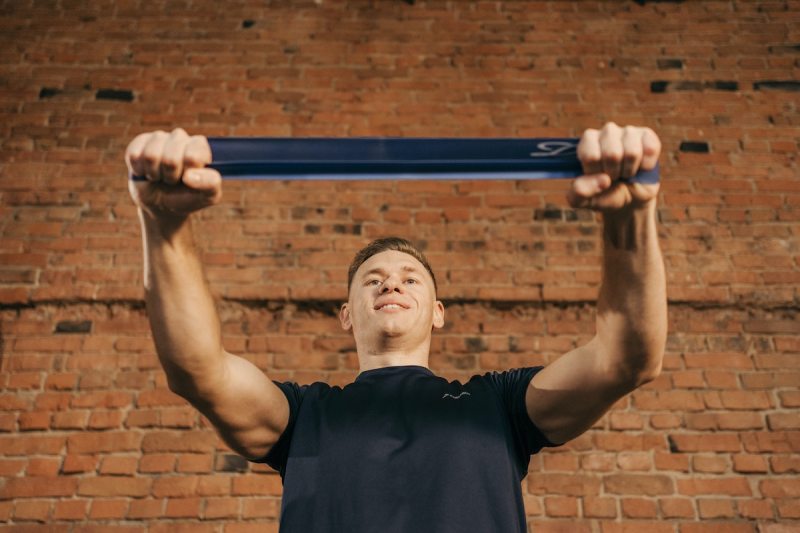
Arm day workout example
| Exercise | Sets | Reps | Rest Time |
| Straight-arm pulldowns | 3 | 10-12 | 1 minute |
| Overhead tricep extensions | 3 | 12-15 | 30 seconds |
| Lateral raises | 3 | 8-10 | 30 seconds |
| Front raises | 3 | 8-10 | 30 seconds |
| Hammer curls | 3 | 10-12 | 30 seconds |
| Concentration curls | 3 | 8-10 | 30 seconds |
Additional tips
Here are some tips for getting the most out of your resistance band arm workouts:
- Warm up before your workout with 5 to 10 minutes of light cardio and dynamic stretching.
- Focus on your form, and don’t use momentum to swing the band.
- Breathe deeply and evenly throughout your workout.
- Cool down after your workout with static stretches.
Editors' Recommendations
- How to run faster and longer to make the most of your workout
- Sound therapy to improve your workouts: does it really work?
- What is zone 2 training anyway?
- The essential rowing machine workouts guide: Tips, workout plan, and more
- 5 effective resistance band exercises for developed hamstrings



